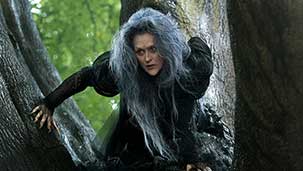Your CV is amazing. You’ve brought lions, tigers, bears, and pretty much every other man-eating predator to Hollywood’s biggest film sets (which explains your upcoming consultant role on Jurassic World). Yet that’s not why you were hired on Into the Woods. Rather than actually bringing something authentic to the screen, it seems the filmmakers wanted you to create a passable facsimile of an authentically powerful auditory experience.
Oh. Now I get it.
I won’t waste time critiquing the singing voices of the stars, which, by-and-large, are perfectly passable. Rob Marshall’s film adaptation of the Broadway classic (of which I confess, I’m not a fan) is lacking in much more egregious ways. Still, the stage origins are painfully obvious: from the clumsy staging of actors (always “accidentally” running into each other), to the confined framing of the physical environment itself (padded constantly by budget-saving fog and shadows). All of this is expected and forgiven in live theatre. On screen it felt like one big cheat after another.
Like the giants. And the wolf sequence. And a certain death scene off a cliff. None of which embraced the power of cinema to immerse, impress or enhance the storytelling experience. All Marshall does is repeat the stage beats while keeping his camera at the same disadvantage as a seated audience member. There are occasional exceptions, but none of the ingenuity that Marshall employed to elevate Chicago from hit theatre to Oscar-winner is apparent here – especially when you consider the material.
Actually, let’s talk about that material. When Stephen Sondheim penned Into the Woods, the concept of what happens after happily-ever-after was considered nothing short of brilliant. Today, reviving fairy tales has become as tired as rebooting superhero franchises. Every princess story is getting a rethink, so saving that twist for the last half of the film means the narrative feels like it’s on auto-pilot for the first half. Had the film treatment been interpreted as joyously campy, or self-consciously satirical, that might have been okay. But instead, all we have to carry us through the familiar story beats are Sondheim’s quirky music and his aversion to catchy melodies.
I know the man is considered nothing short of a musical messiah in the theatre community. But I can’t help feel as though his musicals are for people who are sick of musicals. That might explain why not a single song was stuck in my head after leaving the theatre, other than my trying to rationalize the tacky instances of rhyming the same word with itself (Witches can be right. Giants can be good. You decide what’s right. You decide what’s good).
The fault may be mine for wanting Les Misérables gravitas in a story that was never designed as such, but I still found myself vastly preferring the mediocre remake of Annie over this. I would have much preferred the money going into better effects than bigger stars. Nobody needed to see Johnny Depp’s knee-jerk interpretation of The Wolf – that kind of casting is about as obvious and lazy as, well, rhyming a word with itself.
Make no mistake, those crashing tree sounds you created were as crackling as we would expect in any film. But as the old saying goes – if I hadn’t been there to hear it, I could have believed it all never happened.
Crashing,
Christopher







